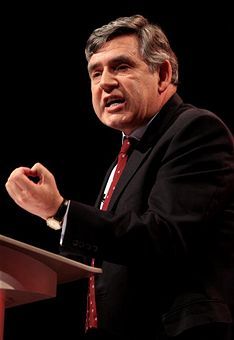 All politicians require a thick skin, but Gordon Brown must have an elephant’s
hide. If an ordinary man had presided over the greatest crash since 1929, shame would compel silence. Not so with Brown, who is unable to see himself as other see him, and has written an account of
the European crisis for the New York Times, which is –
astonishingly – well worth reading.
All politicians require a thick skin, but Gordon Brown must have an elephant’s
hide. If an ordinary man had presided over the greatest crash since 1929, shame would compel silence. Not so with Brown, who is unable to see himself as other see him, and has written an account of
the European crisis for the New York Times, which is –
astonishingly – well worth reading.
Brown, who we should all thank for keeping us out of the Euro, now sees a European state as the only option:‘The exigencies of domestic politics have locked the euro zone into an impossible set of economic constraints — no defaults, no deficits, no stimulus and, of course, no devaluations — which mean that there can also be no banking stability, no lasting growth, no sustained job creation and no boost to competitiveness from their currency. There is no escaping the basic fact that Europe’s difficulties are indicative of deep structural defects — its declining competitiveness, aging population and persistently high unemployment. Its share of world output, which has already halved, is set to halve from 20 percent today to around 10 percent over the next two decades.
What he does not and cannot say is how the creation of a European state can be achieved. The politics look impossible to me because the Euro was an archetypal modernist project, maybe the last modernist political project, in which an elite group decided it had a solution, and resolved to impose it by any means necessary regardless of whether the public wanted it or not. In this limited sense only, the Euro is comparable to the Leninist doctrine that the vanguard communist party could act in the interests of the working class without ever asking the permission of the working class.There is no way out except through the biggest recapitalization of the banks in European history and a wholesale reformation of the euro, which will require the coordination of its monetary and fiscal policy, fiscal transfers from rich to poor nations and a commitment to a common European debt facility.
Whether the founders of the Euro thought in the true Leninist fashion that the end justified the means is neither here nor there. Maybe they knew that a central bank without a central government could never work, and lied because they hoped that the unworkable currency would eventually force the creation of a European state of their dreams, or maybe not. Their motives do not matter because to the peoples of Europe it feels as if they have been lied to. The Germans and the Dutch are being told by Brown and many others that they must take on the debts of southern Europe, despite all the assurances to the contrary. The peoples of southern Europe are being told that they must lose any democratic say in fiscal policy, despite the promises Brussels made to them too. Indeed all Europeans are hearing to varying degrees that super-national structures with weak or non-existent democratic controls must now decide policy. Unsurprisingly, everyone is furious and withdrawing consent from the European project.
I am sure that Brown is right and the crisis can only be solved by a European debt union and some kind of central finance ministry enforcing fiscal controls. But like the Euro, it is very hard to see how his ideas will work in practice, so it looks as if we’re just going to have to live with a rolling crisis.







Comments